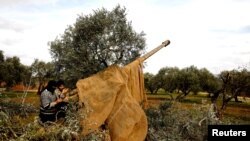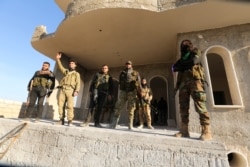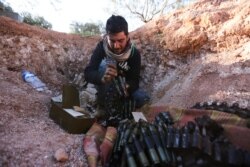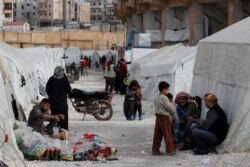Fighting in Syria's Idlib province is escalating with Turkish President Recep Tayyip Erdogan claiming rebels backed by Turkish troops have recaptured a strategic town from Damascus forces.
"Developments in Idlib have turned to our advantage. We have three martyrs, let them rest in peace. But on the other hand, the regime's losses are very big," Erdogan said in a speech Thursday.
Syrian rebels reportedly backed by Turkish special forces and artillery recaptured the town of Saraqeb on Thursday. The northwestern town, located on the crossroads of two main highways, is pivotal to both sides.
Turkey has deployed thousands of soldiers backed by hundreds of tanks and armored vehicles in Idlib in a bid to thwart an offensive by Damascus to seize control of the last rebel stronghold.
Fighting in Idlib is set to escalate further with Ankara's ultimatum to Damascus to give up all its recent Idlib military gains by the end of February.
"When the time given to the regime to withdraw expires, the Turkish Armed Forces will carry out their duties based on the orders they receive, and nobody should doubt our determination about this," Omer Celik, spokesman of Turkey's ruling AKP, said Thursday.
Deadlocked talks
Diplomatic talks between Turkey and Russia in Ankara to resolve the Idlib crisis ended in deadlock Thursday.
"To find a middle ground between Russia and Turkey seems difficult," said former senior Turkish diplomat Aydin Selcen, who is now an analyst and host for Medyascope, an online news channel.
"There is a narrow window of opportunity to find this middle ground," he added. "But it's difficult if not impossible for Erdogan to find this reverse gear and to pull out [militarily] of half if not more from this Idlib pocket. This is a really worrying point because any little error can blow this to full-out war between Syria and Turkey."
While Ankara and Moscow back rival sides in the civil war, the two countries are cooperating to end the conflict. But Idlib is straining bilateral ties.
In an apparent snub, Moscow rejected Erdogan's call for Turkey to host a four-way summit on March 5 with Russia, France and Germany.
The Kremlin is reportedly offering an alternative gathering involving only Russia, Iran and Turkey.
But whatever the format of any international gathering to resolve Idlib, analysts say there appears to be little common ground between Moscow and Ankara.
"It fits with Russian interests if the Damascus regime takes control of the entire country. Russia aims to make the Turkish military presence in Idlib region disappear," said Zaur Gasimov, a Russian expert at Germany's Bonn University.
"The issue of refugees and displaced persons that would flow into Turkish territory from Idlib is additional pressure leverage for Moscow in its interaction both with Turkey and with Germany and France," Gasimov added.
Displaced Syrians
The United Nations says nearly a million Syrians have been displaced by recent fighting in Idlib. Hundreds of thousands of refugees have fled to the Turkish border.
With Turkey hosting over 3.5 million Syrians, Erdogan has repeatedly warned that the country cannot take in any more refugees.
"Erdogan is not bluffing, he will attack Damascus forces," said international relations professor Huseyin Bagci of Ankara's Middle East Technical University. "He can't afford to let Damascus overrun Idlib. He can't allow any more Syrians coming to Turkey."
"But Russia, they are not afraid of Turkey, and they will continue to support Damascus. There is no retreat neither in political or military terms," he added.
However, given the recent dramatic improvement in Turkish-Russian relations, much to the concern of Turkey's NATO allies, diplomatic efforts to avoid confrontation are expected to continue.
"The intensity of Turkish-Russian cooperation in all fields, it is so high that both Turkish and Russian diplomats would likely find a solution. A direct military confrontation can hardly be imagined," said Gasimov.
Turkish casualties
On Wednesday, Erdogan ratcheted up tensions, suggesting a preparedness to test Russia's control of Idlib's airspace. A Russian missile system, along with fighter jets, has shut out Turkish airpower, meaning Turkey's ground forces in Idlib have had little protection from Damascus regime airstrikes.
Airstrikes have killed nearly 50 Turkish soldiers in the past few weeks, including 29 killed Thursday — the highest single-day death toll for Turkish troops in more than three years.
The growing number of Turkish casualties are adding to rising tensions with Moscow.
"Even the pro-AKP press slowly started to highlight Russian atrocities and how we are being betrayed," said analyst Atilla Yesilada of Global Source Partners. "But I still don't see any official policy change towards Russia."
Russian media is starting to attack Ankara, accusing Syrian rebels of using Turkish missiles to try and shut down Russian jets.
U.S. support?
Washington — sensing an opportunity to prize apart Turkey from Russia — has been lobbying Ankara behind the scenes.
U.S. Secretary of Defense, Mark Esper, is scheduled to talk with his Turkish counterpart Hulusi Akar on Thursday. Ankara reportedly is looking for the deployment of American Patriot missiles to create a no-fly zone over Idlib.
"We are trying to find a solution to air cover over Idlib," Erdogan said Wednesday.
"Don't expect the Americans to offer military support to Turkey," said international relations expert Soli Ozel of Istanbul's Kadir Has University. "They [Washington] certainly do not want to engage in war with either the Syrian military or the Russians."
Moscow is likely calculating that Ankara will step back, given its isolation; however, analysts warn such a strategy carries considerable risk.
"From a diplomatic point of view, its brinkmanship," said Selcen. "Here is a still window of opportunity for diplomacy as both Russia and Turkey think that the other one is too valuable a partner to lose over Idlib. But human error from either side can create a big disaster."







